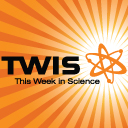Podcast: Play in new window | Download (Duration: 1:25:35 — 78.8MB)
CRISPR Alert, Planet 9?, Memory Boost, Falcon Meal Plans, Ant Architecture, Squirrel Appreciation, Algae Brain Damage, 2015 Wuz Hot!, Snake Deodorant, Dissolvable Implant, And Much More!
Disclaimer, disclaimer, disclaimer!
The stories on tonight’s show came from… the INTERNET! But how did they get there???
15 years ago, if I needed to research squirrels, I would have to go to the library, or reference my wall of encyclopedias, or perhaps, I could pop in my Britannica CD-ROM.
What’s a CD-ROM, you ask? What’s Encyclopedia Britannica? Don’t ask me, go find the wiki!
I can say that today, because on January 15, 2001, Wikipedia was founded. Some may say it is not always accurate, others may say it needs a governing body to approve edits. Yet more may claim it has made our brains weak and lazy.
But I say a crowd-sourced, publicly funded, free encyclopedia at the tip of our fingertips is a great thing. It means that if I use a word, or reference an animal, that you don’t know, you can look it up, join the conversation, and get informed. It means that all it takes is an internet connection to have access to a wealth of information. It means that the playing field is just a bit more level for all of us seeking knowledge. It means that a science podcast and their Doctor in charge are a citable organization with a record on file. And it means that you don’t have to be paying into some conglomerate’s pocket to get out the truth.
Sure, that also means that silly things sometimes make their way onto the web, but enough Wikipedians are on the case to correct errors or spoofs. That being said, please, please, please don’t cite wikipedia in your essay for school, and we in return, will make sure our stories are the real deal, too. And we’ll be looking back at you for all of eternity, from the wiki page titled…
This Week in Science… coming up next!
CRISPR Alert
It’s CRISPR’s history making news this week. Eric Lander of MIT published a history of the gene-editing system, which while a fabulous tale of the efforts of scientists from around the world also appears to have some glaring bias. Namely, to highlight the work of MIT and the Broad Institute who are vying for patent rights.
Planet 9?
Astronomers from Cal Tech say they have found a 9th planet. They haven’t seen it yet, but measurements suggest that it’s some 20 to 100 billion milles out there.
Memory Boost
Turns out our brains might be capable of more than a petabyte of memory storage.
Are falcons keeping small birds hostage for a later meal?
We’re not sure. Anecdotal evidence reports birds that have been plucked and crippled, trapped in crevaces, and this may have all been done by a falcon to keep their future meal “fresh.” If so, wow… Brutal…
Happy Squirrel Appreciation Day! Now RUN IN FEAR
Squirrels are excellent problem solvers, but there are many variations in abilities and tactics among them.
Ants leave blueprints out for their coworkers
As ants build a nest, they deposit pheromones as they construct to leave instructions for their fellow worker ants. Now that’s teamwork!
Support us on Patreon!
Algae Brain Damage
An amino acid-like toxin produced by blue-green algae called BMAA was showed to cause neurdegeneration in vervet monkeys, conclusively linking this environmental component to dementia.
Pregnant? Don’t Travel Here
14 countries have been put on the CDC’s travel warning list for pregnant women due to viral outbreaks of a mosquito-borne disease called Zika that causes microcephaly.
2015 Wuz Hot!
Hottest year on record, and 2016 looks to be a scorcher as well.
Puff adders have figured out how to camouflage their scent.
Good thing we are not small rodents!
Dissolvable Implant
A new brain implant for wireless information transmission that dissolves over time without causing inflammation is in development, and has successfully been tested in rats.
Reanimated Tardigrades!
Japanese researchers revived the microscopic creatures after 30 years in dormancy.
Largest Prime Number!
Found in Missouri, we have a new big prime.
SpaceX Lessons
They almost landed on a boat.
If You love TWIS, please consider making a donation below.
Don’t forget to tell a friend about TWIS, and to check out our Patreon page!



Prime numbers are used in data cryptography and data compression. Using very large primes allows for stronger encryption.
Why? WHY!? WHY!? “They could be doing something else with those computers!?” Now science has to be immediately practical? I’m sorry I thought I was listening to “this week in SCIENCE” where we talk about SCIENCE and new discoveries in SCIENCE. I guess new discoveries in math aren’t sciency enough for Blair. Any other podcast I would have ignored any of that, but down playing the importance of a scientific discovery on a podcast about scientific discoveries!?
Oh Trav, can’t you take a joke?
We poke fun on our show, it’s part of the TWIS package. We also discuss the impacts of different fields of science, the Ig Nobels, etc. We know math is important, and part of my job is to ask the questions our listeners may have, and I can guarantee you I wasn’t the only one wondering what the implications of the new HUGE prime was.
Best,
Blair